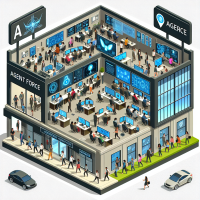The AI Agent Revolution
The AI Agent Revolution: How Tectonic is Unifying Disparate AI Systems for Enterprises AI agents are proliferating at breakneck speed—embedded in platforms, deployed as standalone apps, and built on proprietary or open-source SDKs. Yet as these intelligent systems multiply, enterprises face a critical challenge: getting them to communicate, collaborate, and scale effectively across complex IT environments. Recent moves by Tectonic, Salesforce, and Google Cloud highlight the next frontier of enterprise AI: seamless, cross-platform agent orchestration. We’ve reached an inflection point where human-AI synergy can transform business operations—but only if organizations can unify their agent ecosystems. The AI Agent Collaboration Challenge Today’s enterprises use AI agents for:✔ Salesforce’s Agentforce (CRM automation)✔ Google’s Agentspace (cloud-based workflows)✔ Custom agents (built on Vertex AI, OpenAI, or open-source models) But without interoperability, these agents operate in silos—limiting their potential. Tectonic bridges this gap with secure, enterprise-grade agent orchestration, enabling businesses to: Tectonic and Supported Agent OS: The Glue Holding AI Ecosystems Together Tectonic and Agent Operating Systems (OS) are business-focused platform for orchestrating AI agents across enterprise environments. An “agent operating system” (AOS) is a type of operating system designed to facilitate the development, deployment, and management of AI agents, which are software systems that can act autonomously to achieve goals. AOS systems aim to provide a platform for AI agents to operate efficiently and effectively, offering features like resource management, context switching, and tool integration. AIOS, for example, is a particular implementation of this concept that aims to address the challenges of managing large language model (LLM)-based AI agents How It Works Real-World Use Cases 1. Salesforce + Google Gemini: Smarter CRM Salesforce’s Agentforce now integrates Google Gemini, enabling:🔹 Better RAG (Retrieval-Augmented Generation) for faster, more accurate customer responses🔹 Predictive trend analysis embedded directly in CRM workflows Tectonic’s Role: Deploys multi-agent solutions that turn AI insights into actionable items—like auto-recommending next steps for sales teams. 2. Retail: Unified Customer Experiences A retailer combines: Result: Customers get instant, accurate updates on orders—no manual backend checks required. 3. Financial Services: AI-Powered Risk Analysis Banks use: Outcome: Suspicious transactions trigger automated compliance workflows without leaving Salesforce. Tectonic’s AI Activation Path: From Pilot to Production For enterprises ready to scale AI agents, Tectonic offers a rapid deployment framework:✅ Discovery and Road Mapping – Co-design high-impact use cases✅ Rapid Implementation – Deploy working agents in sandbox environments✅ Pre-Built Industry Libraries – Accelerate time-to-value The Future: Harmonized AI Ecosystems The biggest barrier to AI adoption isn’t technology—it’s fragmentation. With the Agent OS in place, businesses can finally:✔ Break down silos between Salesforce, Google Cloud, and custom AI✔ Automate complex workflows end-to-end✔ Scale AI responsibly with enterprise-grade governance The bottom line? AI agents are powerful alone—but unstoppable when unified. Ready to orchestrate your AI ecosystem?Discover how Tectonic’s Agentforce approach can transform your enterprise AI strategy. Like Related Posts Salesforce OEM AppExchange Expanding its reach beyond CRM, Salesforce.com has launched a new service called AppExchange OEM Edition, aimed at non-CRM service providers. Read more The Salesforce Story In Marc Benioff’s own words How did salesforce.com grow from a start up in a rented apartment into the world’s Read more Salesforce Jigsaw Salesforce.com, a prominent figure in cloud computing, has finalized a deal to acquire Jigsaw, a wiki-style business contact database, for Read more Service Cloud with AI-Driven Intelligence Salesforce Enhances Service Cloud with AI-Driven Intelligence Engine Data science and analytics are rapidly becoming standard features in enterprise applications, Read more



















